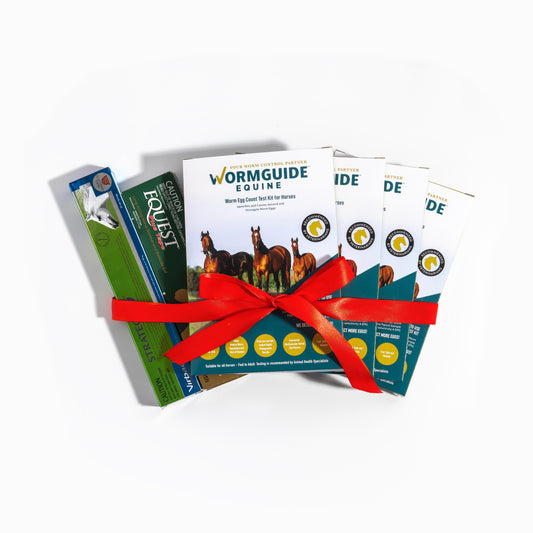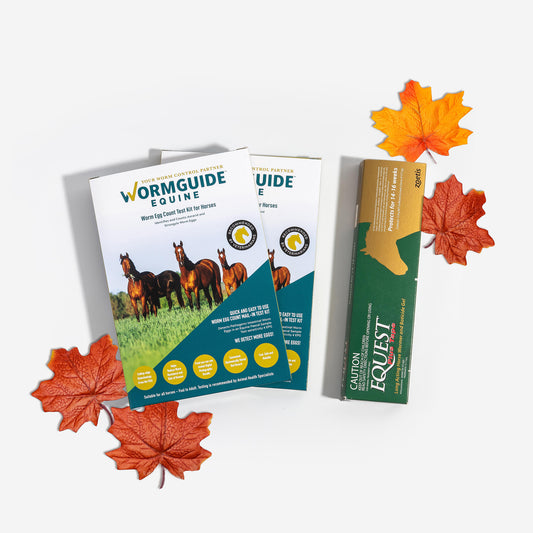When you hear the word ”holistic”, what comes to mind? It means an evidence -based approach to worm control which factors in your horse`s health and welfare - and in the context of delaying/slowing further development of harmful dewormer drug resistance.
You`ve heard the news! Due to overuse of deworming drugs - horse worms have developed resistance to all our available dewormers, and there are no new drugs in the foreseeable future. Eventually our limited deworming drugs will be worthless.
The old way of deworming horses is not working!
To simply stop deworming horses is an efficient way to avoid further resistance, however the universal goal is to prevent parasitic disease so some dewormer treatments are needed in the majority of cases.
Just like human healthcare when treatment is not working, increased scientific evidence and knowledge creates the paradigm shift needed for improved healthcare.
In this article, we explore strategic foundation treatment that should benefit all horses to keep the large strongyle (bloodworm) away.
Bloodworms are capable of causing serious disease to some horses. When it happens it`s bad.
We discuss the real-life example that illustrates how a worm control program for adult horses (over 3 years) should not be based solely on surveillance faecal egg count results.

The holistic approach
The current AAEP guidelines that guides the world`s worm control decisions recommend a holistic approach that combines the following philosophies:
- Worm surveillance to monitor egg shedding levels to support targeted (selective) small strongyle worm control for adult horses.
- Rigorous evaluation of dewormer efficacy.
- Strategic foundation treatments specifically to maintain control over large strongyles (bloodworm) and tapeworms.
What could happen if you stop deworming?
If you stop deworming completely because your adult horse ( over 3 years) consistently has low egg counts, the bloodworm could reemerge.
That`s what happened in Denmark and Sweden where dewormers (wormers, drenches) are obtained by veterinarian prescription-only. Do it yourself rote or preventative deworming treatments are not permitted because it leads to harmful drug resistance.
Denmark was first to introduce prescription-only restrictions of horse deworming drugs in 1999, but other European countries have implemented similar legislation over recent years.
The purpose of that law is to get people to deworm horses less and reduce the selection pressure for drug resistance. Veterinarians diagnose the condition for treatment and often base decisions on FEC results above a certain cut-off value.
So a significant number horses do not receive any treatments if they always have low egg counts.
The side-effects of not deworming at all
The bloodworm (large strongyle) reemerged. And now Denmark and Sweden have bloodworms in their horses. This validates concerns about it`s reemergence with changes in worm control strategies if based solely on egg count results to support targeted (selective) therapy.
One or two strategic basic foundation treatments (ivermectin or moxidectin) applied to all horses are advisable to effectively break the life cycle of the bloodworm - despite egg count results.
Do we have the bloodworm in Australia
While rare nowadays in managed domestic horses, wild horses have bloodworm. A study in south-east Australia found bloodworm (large strongyles) in free-roaming wild horses. The authors warn it is important for horse owners who may adopt trapped, rehomed and domesticated wild horses to be educated about the bloodworm to minimise the risk of spreading infection to other domestic horses.
FECs do not detect bloodworm (large strongyle) eggs
The eggs are the same as other strongyle eggs. A larval culture is required with expert analysis for identification. It`s a time consuming process and comes at a cost.
The difference is the life-cycle journey it takes inside the horse compared to the small strongyle
Just like small strongyles FECs do not detect immature or larval stages of large strongyles because they don`t lay eggs yet. Both small and large strongyles cause the greatest disease during their larval stages.
However, the bloodworm (large strongyle) is the one that can be severely damaging with various clinical signs from colic to peritonitis. Scientific name: Strongylus vulgaris is the single most pathogenic intestinal worm of horses!
Cover your bases
Therefore, worm control rests on a foundation treatment. It`s like a security measure. At a maximum, treatments could be administered to all horses twice annually, at regular 6 month intervals - Autumn and Spring.
Additional one or two treatments should be targeting adult horses with a high strongyle egg counts to knock down the number of eggs on pasture.
How WormGuide compares
A good faecal egg count should align with the up-to-date `count more eggs principle` combining highest precision for increased reliability, and eliminating many sources of human error. Remarkable 21st Century high-tech have made it possible.
At WormGuide, we
- Use 10 times more poo
- Detect more eggs
- Count more eggs
- Use digital imaging
- Computerised counting
- Identify worm types
- Eliminate human error
- Provide highest precision
- Provide better accuracy
- Reduce sampling error
- Use the scientifically validated Parasight System
We do this for one reason - because a good faecal egg count (FEC) has become very important in recent years due to the ever increasing anthelmintic (dewormer) drug resistance.
Are you sure you`re not still using something that hasn`t worked for years?
Late Autumn /Early Winter foundation deworming is a good opportunity to evaluate the dewormer you use. TEST TREAT CHECK once a year.










